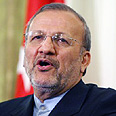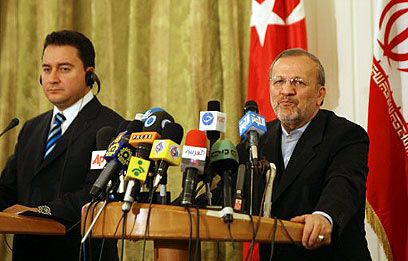
Mottaki. Secret agreements
צילום: איי אף פי
Iran accuses US, Israel of supporting Kurdish rebels
Islamic republic's foreign minister tells reporters in Tehran at that 'terrorist activities' have increased in northern Iraq since 'foreign forces' arrived there
Iran's foreign minister on Sunday accused the US and Israel of supporting Kurdish separatists in northern Iraq, but his Turkish counterpart distanced himself from the claim, saying he didn't think Washington was behind the Iraq-based rebels but stressed that Ankara would do what was necessary to stop them.
Iranian Foreign Minister Manouchehr Mottaki told reporters in Tehran at a news conference with Ali Babacan, Turkey's foreign minister, that "terrorist activities" have increased in northern Iraq since "foreign forces" arrived there.
"From our point of view, efforts by Israel and the US are behind some terrorist activities. Most probably, some secret agreements have caused a lack of confrontation against terrorism," Mottaki said, referring to Iraq-based Kurdish rebels.
"We hope this part of the US policy would be corrected," he said.
But Babacan, who was in Iran to lobby for support for the Turkish side in its conflict with the rebel Kurdistan Workers' Party, or PKK, expressed gratitude for Iran's cooperation but did not back Mottaki's accusations against the US and Israel, which are allies of Ankara. "I don't like to think that the US supports a terrorist group," Babacan said.

Tehran press conference (Photo: AFP)
The Turkish foreign minister instead stressed that Turkey would use whatever necessary to combat the PKK. "Turkey in fighting against terrorism and will use and support all mechanisms," Babacan said. "International cooperation and solidarity is the only way to fight terrorism."
Mottaki offered vague support for Turkey against the PKK but did not elaborate on exactly what Iran would support. "Iran insists on the necessity of using required activities for stopping such terrorist operations," Mottaki said.
Turkey has demands more action
Babacan's comments echoed those of Turkish Prime Minister Recep Tayyip Erdogan, who on Saturday said Turkey will fight the Iraq-based Kurdish rebels when it is needed, regardless of international pressure.Erdogan said he would not be constrained by other nations - despite concerns from the United States, Iraq and other countries that an incursion would destabilize northern Iraq. The conflict in southeastern Turkey between government forces and guerrilla fighters has claimed nearly 40,000 lives since 1984. PKK fighters have killed at least 42 people in the past month, including some 30 Turkish soldiers killed in ambushes.
In recent months, Turkey has demanded more action from the US and Iraq in the fight against the PKK - which Washington and the European Union have labeled a terrorist group. The sharp escalation in the fighting has brought Turkey to the brink sending troops south across the border into Iraq.
Iran has its own problems with Kurdish opposition groups, particularly the Party of Free Life of Kurdistan, known by its Kurdish initials PEJAK.
An offshoot of the PKK, PEJACK is struggling for autonomy for Iran's Kurds due to alleged government discrimination, and the mountainous Iran-Iraq border region has been the scene of sporadic clashes between PEJAK and Iranian forces in recent years.
PEJAK and PKK bases in Iraq's Mount Qandil region, right on the border with Iran and Turkey, have long been a sore point in relations between the three countries. Babacan also visited several Arab countries in recent weeks to gauge their support for a Turkish offensive into northern Iraq.
Both the Egypt and Jordan have cautioned Turkey against unleashing a troop offensive against the rebels and urged dialogue. Alone among Arab countries was Syria, an Iran ally which has come out in support of Turkey.










